Why Do People Flee? Causes of Migration
We are interconnected; we share Earth's resources, climate and its challenges.
Most people in the world have had the experience of leaving the place where they grew up. Maybe they will only move as far as the next village or city. But for some people, they will need to leave their country entirely - sometimes for a short time, but sometimes forever.
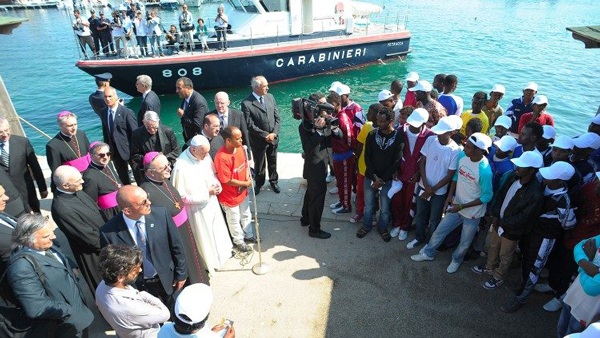
Pope Francis (Vatican News)
"Despite the problems, risks, and difficulties to be faced, great numbers of migrants and refugees continue to be inspired by confidence and hope; in their hearts they long for a better future, not only for themselves but for their families and those closest to them."
Pope Francis, Homily at Lampedusa, 8 July 2013
Every day, all over the world, people make one of the most difficult decisions in their lives: to leave their homes in search of a safer, better life.
War and displacement
Since the Russian invasion of Ukraine in February 2022, more than 1.2 million people have fled to neighbouring countries.
Over 6.8 million people have fled conflict in Syria, and many more are displaced inside the country. Turkey and Iran are providing safety to around 3.4 million Syrian refugees.
Of the 384,245 asylum seekers granted protection status in the European Union in 2022, more than a quarter came from war-torn Syria, with Afghanistan and Venezuela in second and third place respectively.
(UNHCR)
"Children, women, old people and men all ran to escape the bombing. We were surprised when the bombing was coming over our heads; us and the other displaced people were running away with our children and nothing else."
Watfa and her family are some of millions of people displaced by the war in Syria.
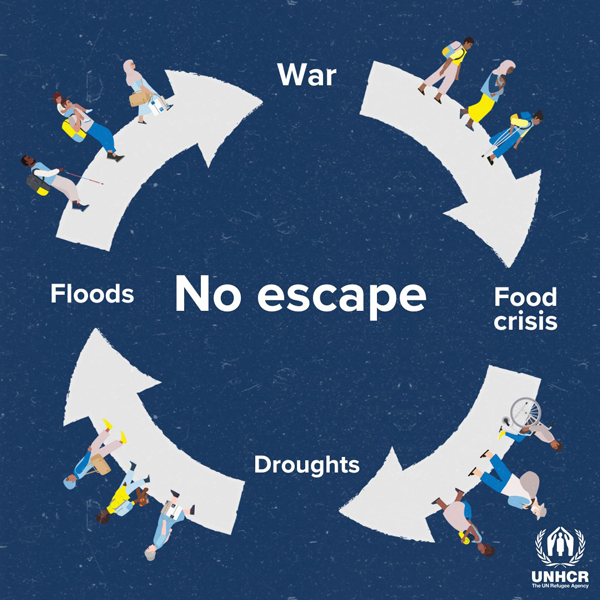
Persecution
Persecution because of one's ethnicity, religion, race, politics or culture pushes people to leave their country. Persecution can be related to action by the authorities of the State, but may also emanate from non-state agents, such as armed groups, criminal or organized gangs, family members or the general population, where the State is unable or unwilling to provide protection.
"The day I decided to leave was when I realised that I could lose another child. Attacks were common, and more and more children were either killed or kidnapped, and these were mostly boys."
Falta, speaking after her village in Nigeria was attacked by Boko Haram, and her husband abducted. She fled with her children to neighbouring Cameroon.
Around three-quarters of refugees are hosted in countries with low or middle income.
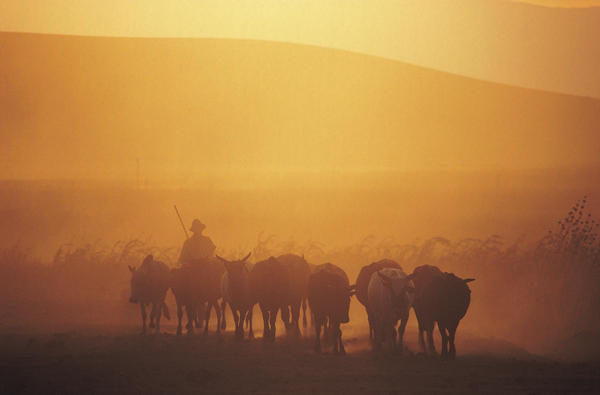
Climate and Biodiversity crisis
The environment is a driver of migration, as people flee natural disasters, such as floods, hurricanes and earthquakes. Climate Change is expected to exacerbate extreme weather events, meaning more people could be on the move. Farmers in Africa's Sahel region are leaving their farms as fields become arid and desertified, ending the livelihoods of many struggling farmers. Estimates of environmental migrants vary from 25 million to one billion by the year 2050 (International Organization for Migration figures).
"Life was simpler in the past when we had animals and farms. However, due to the drought, we no longer had enough water and grass for the animals. The animals died of hunger and the farms dried up because of lack of water and rain. It was really sad to watch the animals die because of this. We were forced to move to this camp for a better life."
Deeqo, one of the many people displaced by the drought in Somalia.
Natural Disasters
Natural disasters have the potential to displace hundreds, thousands, or even millions of people at a time. While some may seek shelter with family or friends, others are forced to wander indefinitely or settle in displacement camps that are often overcrowded and lack essential water, hygiene, and health care infrastructure.
A magnitude 6.0 earthquake struck Afghanistan at the end of August 2025, killing at least 2,200 people. The UN believes half a million people may have been affected by the earthquake, including 250,000 children. Humanitarian teams often had to drive long distances to reach villages, including hours spent on foot, highlighting the logistical barriers to aid delivery.
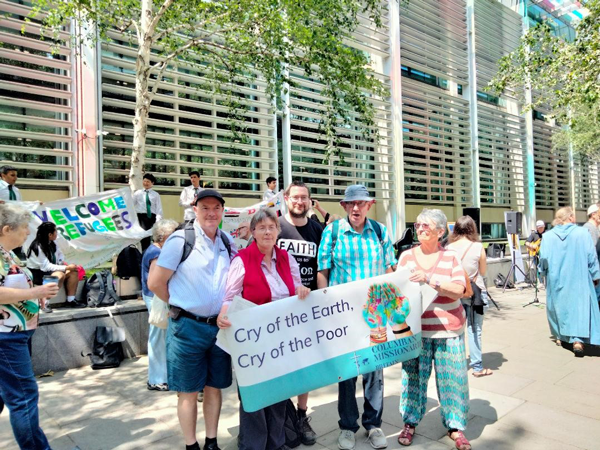
Columbans highlight the link between natural disasters and migration
"As we drove towards the epicentre, we saw families walking in the opposite direction - displaced, carrying what little they could. Many were still wearing the same clothes from the night of the earthquake. Mothers and fathers were carrying their children, some with fresh bandages covering their injuries."
Shannon O'Hara, who oversees the coordination of the UN's humanitarian office in Afghanistan
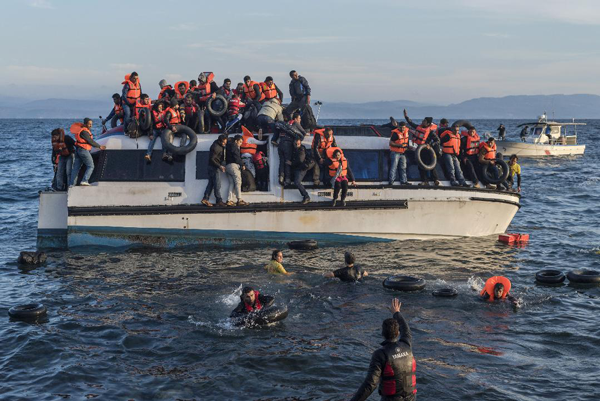
Refugees in distress in the Mediterranean (Wikimedia Commons)
Political and/or Economic Instability
If political or economic conditions are not favourable and appear to be at risk of declining further, a greater number of people will migrate to countries with a better outlook. Pull factors include higher wages, better employment opportunities, a higher standard of living and educational opportunities, security and peace.
"If I had opportunities here, I would not have been so desperate to try and go to Europe the way I did. If young people like me had jobs and a way to earn a living, we would not set off on these dangerous journeys….. Although I did not make it to Europe, I genuinely do not regret trying to get there. It was the only option I felt I had at the time."
Emmanuel, from Ghana, nearly died in the Mediterranean Sea trying to reach Europe in a small rubber boat that was not sturdy enough to make the crossing. He was returned home but with reintegration support; a small grant gave him a livelihood, and he started a business transporting yams to the market.
Countering popular myths
Popular myths such 'they are all scroungers' or 'taking our housing' are being countered by Christian and other groups and organisations who have first-hand experience of migrants. They work to build a community where people respect one another and try to make a positive impact locally and nationally. Many Church people offer services to local support groups in order to offer help asylum seekers in a discrete and sensitive way.
Lobbying 'For People, For Climate, For Nature'
Columbans joined around 5,000 people at a mass lobby of Parliament on 9 July 2025, calling on MPs to show bold leadership in tackling the climate and biodiversity crises, justice and peace. MPs were asked about delivering vital funding to communities hit hardest by climate change, tackling the global debt crisis, supporting communities in the global south to stay in their homes, and securing a greener and fairer future for UK citizens, and restoring Nature. Young people travelled to it from a numbers of schools.
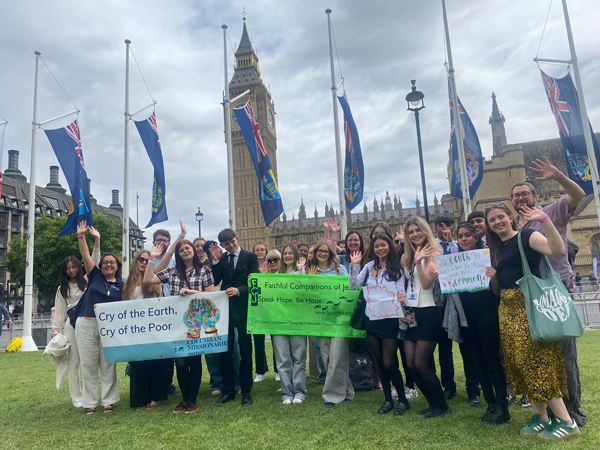
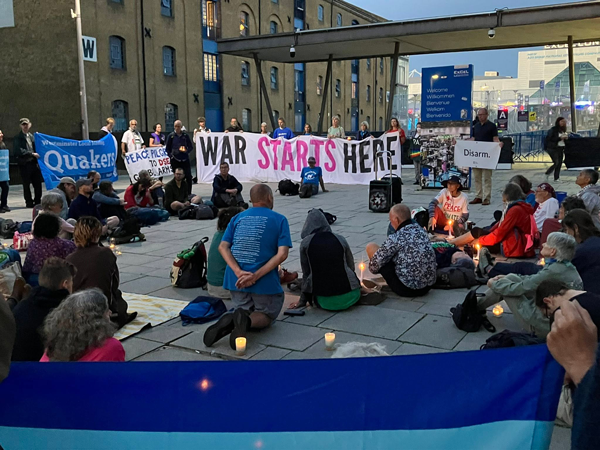
Protesting Arms Trading
In early September 2025 East London's Excel Centre hosted an arms fair, Defence and Security Equipment International (DSEI). It is the UK's largest arms fair for the trade of military technology and weapons and Christian groups were amongst those praying and protesting outside. September 11 was a day focusing on Migrant Justice, where stories were read outside the exhibition hall of people who lost their lives to armed conflict and fled their homes in 2024.
